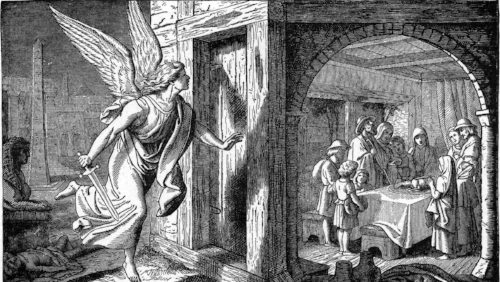Happy New Year…maybe
Red stuff: Eat it! (Genesis 25:30) - A Thanksgiving Reminder
The Jubilee (Leviticus 25) [A New Year's Card Talk]
A New Year's Eve Card Talk (2013)
2014 is upon us. Fu.. .we mean, "yeah!"
2013 was great/horrible year for A Game for Good Christians. We were born, we shat our pants, we experienced growing pains with your help, and here we are: looking with hope and terror at what the New Year will bring.But let us usher in that New Year with some old words.
Leviticus 25 describes what is alternately called "The Sabbatical Year" and "The Year of Jubilee" (after which many a mega-church, Christian self-help poetry, and terrible small-church-group activities have been named).
In lieu of New Year's resolutions, we would like to suggest five simple (and not so simple) practices and ideas from this text which might make the upcoming months more enjoyable for us all.
1. Get some God-blessed rest ( ... but in the seventh year there shall be a sabbath of complete rest for the land, a sabbath for the Lord ... vs 4-5)
2. Try to suck less ( ... then you shall have the trumpet sounded loud; on the tenth day of the seventh month — on the day of atonement — you shall have the trumpet sounded throughout all your land. .. observe my statutes and faithfully keep my ordinances, so that you may live on the land securely. vs 9; 18)
3. Call your mother / Visit your family ( ... It shall be a jubilee for you: you shall return, every one of you, to your property and every one of you to your family. .. vs 10)
4. Don't be a dick to your neighbors ( ...when you make a sale to your neighbor or buy from your neighbor, you shall not cheat one another. .. You shall not cheat one another, but you shall fear your God; for I am the Lord your God. vs. 14; 17)
5. Don't be a dick to your family ( ... If anyone of your kin falls into difficulty and sells a piece of property, then the next of kin shall come and redeem what the relative has sold ... If any of your kin fall into difficulty and become dependent on you, you shall support them ...Do not take interest in advance or otherwise make a profit from them, but fear your God; let them live with you. You shall not lend them your money at interest taken in advance, or provide them food at a profit . . .if any who are dependent on you become so impoverished that they sell themselves to you, you shall not make them serve as slaves... 25, 35-37; 39)
Perhaps the real lesson is, just don't be a dick to anyone: God, others, or yourself.
Perhaps the lesson could be stated positively:
" 'You shall love the Lord your God with all your heart, and with all your soul, and with all your mind, and with all your strength' [and] 'You shall love your neighbor as yourself.' There is no other commandment greater than these." ~ Jesus in Mark 12:30-31
But what do we know: we made this game, you probably think we're going to Hell, and we miss Dick Clark.
Happy New Year from the degenerates at A Game for Good Christians!!!
David carrying a warm sack of 200 foreskins (1 Samuel 18:26-28)
It's a simple love story really.
Princess Michal, daughter of King Saul, falls in love with the young, heroic, and dashing David: one time royal singer, newly minted premier warrior of the realm. The local boy makes good. But daddy is not happy. For many reasons, Saul wants David dead. And now that daddy's little girl wants to make him part of the family, Saul figures he can kill two birds with one stone: If David wants to marry Michal he must engage a Philistine horde in battle and return with 100 foreskins to prove his worth.
David, mostly unperturbed, set out about the task, returning with 200 foreskins! Why "warm"? Because we like to imagine things went down as Joseph Heller describes them in God Knows:that it took young and naive David a bit of time to realize that it would be much easier to take the foreskins off the Philistines if he killed them first!
As we come to the end of the second week of the New Year, how are those resolutions coming? Did you at least attempt our suggestions? Was your personal mission for the year any harder than David's? (That's what she said.)
Have you already given up or are you primed to continue with double the effectiveness that you originally planned for?
Perhaps it's time to stop making excuses, grab hold of your desire and ... you get the idea.
But what do we know: we made this game and you probably think we're going to Hell!
“Good Christians regularly raise unspoken prayer requests for__________” A Creed Card Talk/Reflection
Silence reigns as everyone awkwardly stares at the floor, the ceiling, and into the ethereal middle distance between eyes. The clever ones bow heads and pretend to pray. But all are individually thinking about that thing draining their minds of life. That thing they will not share with the rest of the group.
The unspoken prayer request is a staple of protestant youth groups, CCD classes, college Bible studies, and church small groups. They are what remain after the public prayers are heard. They are the shame of our crisis. The sin we pretend is private. The blessing we fear will sound like a brag. The worry we hide. The sum total of all we don’t want others to know about us because we’re afraid of what they will think:
"I don’t want them to know that I struggle with this . . .”
“My problems are not as important as what she just said . . .”
“They’ll know I think about those things . . .”
“They will think that I am just complaining . . .”
“This too will pass. No need to have other people involved . . .”
and besides,
“God knows what’s in my heart, so I don’t have to say it out loud.”
This last is the most Hell worthy, pretending to be holy, bullshit, cop-out we know.
To be clear: There are things you should keep to yourself. Sometimes, in some places, in some contexts, you should keep your God-loving mouth shut. But beyond those times of wise silence who do you trust? Who are you talking to about that-which-shall-not-be-named? If the answer is “no one,” your state of affairs is so much worse than you may have imaged.
The concept of the 3am friend is nothing new: the person you can call at three in the morning and they will be there physically, emotionally, and/or spiritually. The entire legal system in the Hebrew Bible was predicated on relationships within community, in terms of both not doing to others what you would have done to you, as well as the mitzvoth— acts of love and service— done not only for family, superiors, and social equals, but the marginalized and liminal: the poor, the widow, the orphan, the stranger.
We know that two heads are better than one, in work, in love, in laughter, in sadness. When we fall we need someone to lift us up, and God help the person who falls when they are alone. Even better is group of friends, for a threefold cord is not quickly broken (Ecclesiastes 4:9-12).
We know that healing comes through talking about our faults and troubles, and through praying with others (James 5:16); we know that time spent with other of the same mind is how we can push each other to do better in life (Hebrews 10:24-25); and we know that with all the talk about forgiving each other (Matthew 6:12-14, Mark 11:25, Luke 17:3-4, 2 Corinthians 2:10-11, Ephesians 4:32, Colossians 3:13) , know that we are called to love one another (John 13:34).
But to love each other we must allow others to love us. We must love ourselves by allowing other people into our lives. We must accept grace as much, if not more than, we extend it to others.
Perhaps we need to re-examine the value of friendship and community. We can’t go it alone. At least not well and not for long.
But what do we know. We made this game and you probably think we’re going to Hell.
buzzfeed.com
"Being long dead before the Lord answers your prayer" (Jeremiah 29:10-11)
"For I know the plans I have for you," declares the Lord, "plans to prosper you and not to harm you, plans to give you hope and a future." (Jer 29:11)
Oh how good Christians love this verse as long as it is taken completely out of context.
In the 29th chapter of Jeremiah, the prophet writes a letter to the people in Exile: the people who have been taken away as captives from their homes. People in pain and mourning. The people writing Psalm 137 and wanting the heads of enemy babies dashed against rocks. [More on that here]
The above words are the most famous from this letter because they are so comforting. But they are only some of Jeremiah's statements to them. Good Christians tend to ignore the rest of the words, because they can be as jarring to our modern senses as they must have been to the hearts of the original audience. Before Jeremiah relays God's plans for a hope-filled future, he outlines the present God wants the people to live in.
Paraphrased, "Thus says the Lord":
Make yourself comfortable. Buy a house. Make it look nice. Plant some flowers and crops. Eat something. (vs 5)
Get married and make a lot of babies. When they grow up, find them spouses. Then spoil your grandkids. (vs 6)
Pray that only good things will happen to your oppressors. Yes, I said, "good things." Not bad. And if anyone tells you that it's My Will for bad things to happen to them, or for all of you to leave Exile, to be rescued, they are liars. I want all of you to stay there. (vs. 7-9)
It's going to be at least 70 years until I save the people. You're probably going to die there. (vs. 10)
For surely I know the plans I have for you, says the Lord, plans for your welfare and not for harm, to give you a future with hope. (vs. 11)
A good Christian has a habit of making this his/her "life verse" without acknowledging two things:
1. The "you" in the passage is plural, not singular. God is speaking to the people as a whole, not one individual.
2. God was asking the Israelites in Exile to accept the situation as it was presented, and continue to live and serve.
The people who heard these words were told that they would die in Exile, but their children and grand-children would survive. Their descendants would live in the promised future. Thus these were not words about individual salvation, but rather communal commission.
In the midst of the captivity, under oppression, when things were not as they should be, God asked them to stay faithful and teach their children how to do so as well, even though they would not see home again.
Perhaps God asks the same thing of us as well. (But who wants that as a "life verse"?)
Perhaps this is why the Church and the Synagogue has upheld the example of Esther and Susannah, Hananiah, Mishael and Azariah, and the prophet Daniel: young people who were raised to stand strong and survive in an oppressive culture by their families. Even though the ones who raised them didn't make it out alive. Even though they didn't make it out alive.
Perhaps we could apply the words of this letter to our lives personally by twisting them to say that God will deliver us individually from some present or future aliment if we view our selves as the Exiles and their children and grandchildren in the text. But this seems like a stretch.
Perhaps it is better to read them in context and see them as words which teach us to hold on, to endure, to encourage others in our community when we are going through trouble, when certain realities will not change for us.
Perhaps we can continue to love others regardless of our fate, and find more appropriate passages which speak to God's rescue of our individual lives.
But what do we know: we made this game and you probably think we're going to Hell.
"King Solomon needed so many women because he was over-compensating for _____. "
1 Kings 11:3 records that among Solomon's women were 700 princesses and 300 concubines. A close reading of the Hebrew indicates that this verse is merely recording the number of foreign wives and concubines, not the total number of his women, which means that he had many more wives than this. The focus of the passage is on the women who worshiped gods other than YHWH and Solomon's building of high places and altars to those gods, which begs the question, what happened to Solomon? He was raised to be a good Jewish boy, and good Jewish boys don't marry shiksas, let alone 1000 of them. Seriously. Was the sex that good?
Our two cents: Solomon had mommy and daddy issues.
Read through 1 Kings chapter 1. This part of the "succession narrative" shows that David had no intention of making Solomon king until Bathsheba and Nathan got involved. Taking her cue from the story of Rebekah and Jacob screwing Esau out of his birthright, Bathsheba makes sure her little boy gets the crown by twisting the reality of a frail, old man who can't stay warm even with a beautiful young co-ed wrapped around his body.
Solomon had to live with this knowledge and the fact that his head never quite fully exited Bathsheba's womb; that it was her maternal manipulation that got him the throne, not the divine anointing his father received — attention from on high even Saul was allowed.
Because Solomon's kingdom begins with barely concealed deceit, there were immediate repercussions in the kingdom: an eminent civil war between those who have aligned themselves behind the rightful king (Adonijah, the eldest brother). A war is avoided because Solomon exiles or executes everyone who would stand against him; however, one should not miss that the text records Bathsheba's role in Adonijah's death.
Yes, Solomon built the Temple and centralized worship for the United Monarchy, but he did so on the backs of his people. The Hebrew text describes Solomon's actions in the same ways it does the Pharaoh who stood against Moses and Aaron. Solomon amassed wealth while enslaving his own people, creating Egyptian-like conditions in Israel. And while Solomon built one Temple to YHWH, he built countless more altars to "Astarte the goddess of the Sidonians, and Milcom the abomination of the Ammonites, and "built a high place for Chemosh the abomination of Moab, and for Molech the abomination of the Ammonites ... did the same for all his foreign wives, who offered incense and sacrificed to their gods." (1 Kings 11:4-8) And who physically built those altars? The enslaved people of Israel.
If we believe the sages of tradition, Solomon spent the rest of his life gathering wisdom and wine, whores and wives, vanities upon vanities. In the end his kingdom is divided and his legacy is the punch-line/by-word of the Deuteronomist's warning against kings. (c.f. Deuteronomy 17:14-20)
Perhaps this is part of the reason the book of Ecclesiastes is attributed to him: a book of wisdom and regret after a life ill-spent.
Perhaps he knew of his moral downfall and needed something to keep his mind off of his troubles. Something to keep him warm at night.
Perhaps this is why Solomon needed so many wives and concubines.
Perhaps the king had 99 problems and ...
But what do we know: we made this game and you probably think we're going to hell.
Jesus needing 2-3 people in order to show up (Matthew 18:20)
We’ll keep this example of Christians using a passage out of context so often that it has become a time honored Bible bastardization that no one blinks an eyes at, brief. A Christian cliché at its finest and most painful.
Most of us have heard someone say, “… for we know where 2 or 3 are gathered in Your name …”
Which normally translates as:
“Only a handful of people showed up for Wednesday night prayer meeting, but we’re going to continue anyway, because where 2 or 3 are gathered …”
Or
“God, we know you can do this thing we are asking for, even though there are only a few of us asking, because where 2 or 3 are gathered …”
Or
Some other example of “we have a small number of people, but God, You’re beholden to do what we want because the Bible says so.”
Can we read the passage in context? Please? Just once. Here is what Matthew 18:15-20 actually says:
“If another member of the church sins against you, go and point out the fault when the two of you are alone. If the member listens to you, you have regained that one. But if you are not listened to, take one or two others along with you, so that every word may be confirmed by the evidence of two or three witnesses. If the member refuses to listen to them, tell it to the church; and if the offender refuses to listen even to the church, let such a one be to you as a Gentile and a tax collector.
Truly I tell you, whatever you bind on earth will be bound in heaven, and whatever you loose on earth will be loosed in heaven. Again, truly I tell you, if two of you agree on earth about anything you ask, it will be done for you by my Father in heaven. For where two or three are gathered in my name, I am there among them.”
The passage is dealing with Church discipline. The number of people specified harkens back to Deuteronomy 19:15’s injunction that it takes multiple people (witnesses) to bring charges against someone in the community.
Hence, as a wise friend with more theological letters behind his name than us once said, this passage is best summarized by saying, “where two or three are gathered in His Name, you suck.”
Besides the actually context of the passage, do you think God isn’t present when only 1 person is present in His Name? How’s your theology on that one?
Perhaps we can stop using pithy biblical statements and actually read the words.
Perhaps it’s time that we #BibleResponsibly.
But what do we know: we made this game and you probably think we’re going to Hell.
Hebrew Erotica Masquerading as Christ's Bride (Song of Solomon)
"...why can't these books be holy while still simply speaking of human love and romance? Is it because we've regulated sexuality to the basest, vilest, unspeakable regions of the theistic experience; sex has gotten so much bad press, that a book in the Bible cannot be only speaking about sensuality?"



![O Come, O Come Emmanuel (Isaiah 7:14) [An Advent Card Talk]](https://images.squarespace-cdn.com/content/v1/55a9a1e3e4b069b20edab1b0/1483161046976-X5VJE3CMP9T957O72EII/3d-wallpapers-light-dark-wallpaper-35822.jpg)

![Loving God While Not Being a Dick to Everyone Else (The Whole Sum of the Law, the Prophets, and the Gospels) [A New Year's Card Talk]](https://images.squarespace-cdn.com/content/v1/55a9a1e3e4b069b20edab1b0/1546317381135-1KDYPQ9ONZWH8VQOJDJU/JESUS+nye.jpg)









